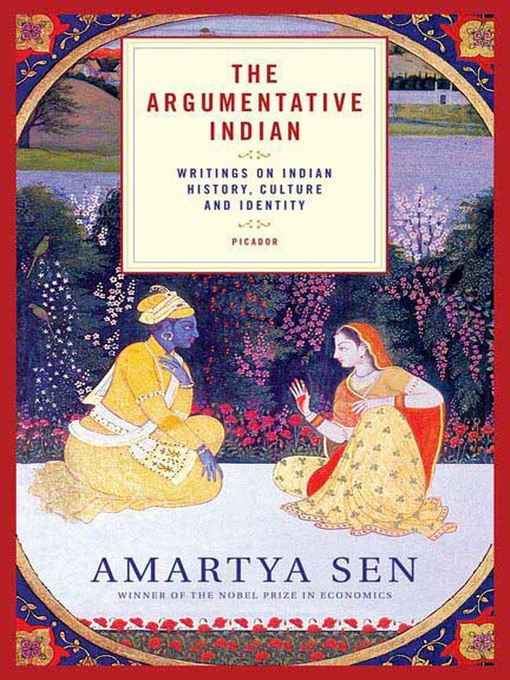A Nobel Laureate offers a dazzling new book about his native country
India is a country with many distinct traditions, widely divergent customs, vastly different convictions, and a veritable feast of viewpoints. In The Argumentative Indian, Amartya Sen draws on a lifetime study of his country's history and culture to suggest the ways we must understand India today in the light of its rich, long argumentative tradition.
The millenia-old texts and interpretations of Hindu, Buddhist, Jain, Muslim, agnostic, and atheistic Indian thought demonstrate, Sen reminds us, ancient and well-respected rules for conducting debates and disputations, and for appreciating not only the richness of India's diversity but its need for toleration.
Though Westerners have often perceived India as a place of endless spirituality and unreasoning mysticism, he underlines its long tradition of skepticism and reasoning, not to mention its secular contributions to mathematics, astronomy, linguistics, medicine, and political economy.
Sen discusses many aspects of India's rich intellectual and political heritage, including philosophies of governance from Kautilya's and Ashoka's in the fourth and third centuries BCE to Akbar's in the 1590s; the history and continuing relevance of India's relations with China more than a millennium ago; its old and well-organized calendars; the films of Satyajit Ray and the debates between Gandhi and the visionary poet Tagore about India's past, present, and future.
The success of India's democracy and defense of its secular politics depend, Sen argues, on understanding and using this rich argumentative tradition. It is also essential to removing the inequalities (whether of caste, gender, class, or community) that mar Indian life, to stabilizing the now precarious conditions of a nuclear-armed subcontinent, and to correcting what Sen calls the politics of deprivation. His invaluable book concludes with his meditations on pluralism, on dialogue and dialectics in the pursuit of social justice, and on the nature of the Indian identity.
-
Creators
-
Publisher
-
Release date
October 15, 2013 -
Formats
-
Kindle Book
-
OverDrive Read
- ISBN: 9781466854291
- File size: 1402 KB
-
EPUB ebook
- ISBN: 9781466854291
- File size: 1402 KB
-
-
Languages
- English
-
Reviews
-
Publisher's Weekly
August 22, 2005
As India's multicultural society confronts violent sectarianism at home and a range of destabilizing forces internationally, these illuminating essays from Nobel Prize–winning economist Sen (most of which began as articles or lectures over the past decade) offer a timely and cogent examination of the country's long history of heterodoxy and public discourse. With sparkling erudition and crisp prose, Sen reminds readers of a capacious cultural legacy that has nourished a plethora of religious communities (including Hindu, Buddhist, Jain, Jewish, Christian, Muslim, Parsee, Sikh and Baha'i), as well as a venerable line of atheist and materialist thought, while fostering ancient advances in science and mathematics, and inclusive theories of governance. Challenging the notion of the West as sole originator of liberal values, the book—which ranges over subjects as diverse as India's ancient calendars, nuclear arms policy, relationship with China, gender and class inequality, representations in the Western imagination and the competing national visions of Tagore and Gandhi—bears forcefully on contemporary debates over multiculturalism, secularism and postcolonial identity. Sen's lucid reasoning and thoroughgoing humanism, meanwhile, ensure a lively and commanding defense of diversity and dialogue.
-
Formats
- Kindle Book
- OverDrive Read
- EPUB ebook
subjects
Languages
- English
Loading
Why is availability limited?
×Availability can change throughout the month based on the library's budget. You can still place a hold on the title, and your hold will be automatically filled as soon as the title is available again.
The Kindle Book format for this title is not supported on:
×Read-along ebook
×The OverDrive Read format of this ebook has professional narration that plays while you read in your browser. Learn more here.

